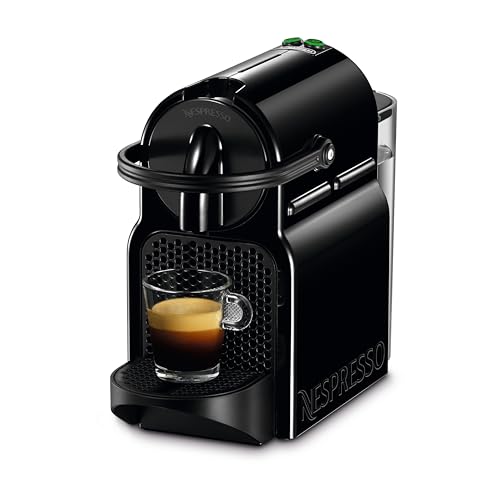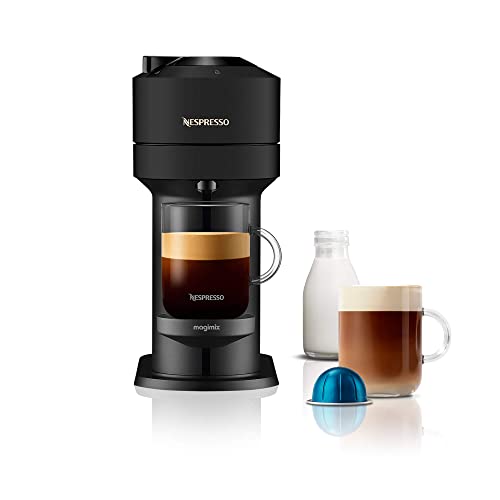10 Things That Your Family Teach You About Nespresso Coffeee Machine
페이지 정보
작성자 Rosaria 작성일24-07-24 23:19 조회65회 댓글0건관련링크
본문
 Nespresso Coffee - The Essenza Mini
Nespresso Coffee - The Essenza MiniThe Essenza Mini is compact and affordable. It's also very easy to use. It does not have features such as water tank or a removable drip tray to stay compact, but it does make excellent lungo and espresso.
 It works by piercing capsules and pumping the water under pressure. This produces various sizes of espresso and coffee drinks, including 1.35-ounce espressos, 2.7-ounces double espressos, 5 ounces of gran lungos, and 14-ounces altos. It can also work with a stand-alone milk frother.
It works by piercing capsules and pumping the water under pressure. This produces various sizes of espresso and coffee drinks, including 1.35-ounce espressos, 2.7-ounces double espressos, 5 ounces of gran lungos, and 14-ounces altos. It can also work with a stand-alone milk frother.Capsules
With the Nespresso system, you can brew the perfect cup of coffee at the press of the button. You can select a single-serving size or a larger size, and each capsule comes with the right amount of ground beans for your preferred strength. You can also add milk powder for an espresso or macchiato latte. The capsules are constructed of biodegradable ingredients and can be disposed of or recycled without guilt.
The pods are made of aluminium which allows them to stand up to the pressure of the machine. The pods are hermetically sealed and cannot be altered with. The coffee grounds stay fresh, safe from oxygen and moisture. Nestle's sustainability goals are aligned with the fact that aluminium is recyclable 100% of the time.
However the system isn't without its drawbacks. For one the machines cost a lot to purchase and use. The capsules are also expensive to purchase and have to be replaced frequently. Also, the machines are only compatible with Nespresso-branded capsules. This has led to a variety of lawsuits between Nestle and third-party companies that use the same extraction process and ingredients as Nespresso.
Despite these limitations, the Nespresso system is a great option for many reasons which include premium coffee and environmental sustainability. It's an excellent alternative to regular tea and coffee, and it has more extraction than most single-serve systems. In fact, one capsule can yield up to 14 ounces of espresso coffee.
The first capsule was created in 1976, and then patented in 1978. Its main features include an cone of aluminum foil with a flat-topped top, an elongated recess that the machine injects hot water and a narrow opening inside the base that is punctured from above and below. The capsule is spun at 7000 rpm by the machine to inject water into the coffee to create a thick, creamy crema.
Water
If you are using a Nespresso machine, it is essential to use high-quality water. This is essential for consistency and also for the flavor and texture. In general, you should choose water that is "filtered" or "spring," and avoid tap or distillation water.
In our laboratory tests, we found that machines that use softened water make more delicious espressos and lungos than machines that use hard water. This is because hard water causes calcium deposits, as well as other issues that degrade the flavor of your coffee.
During each cup in each cup, the Nespresso coffee machine pumps out hot water at a high pressure. This process is referred to as extraction. The duration, temperature, and pressure of the extraction process is what determines the taste and intensity of your coffee.
The original machines break the capsule and then pump it, while the Vertuo model reads the barcodes to determine the amount of water required for each espresso. The Vertuo models can make six different drink sizes, including lungos and espressos, with or without a cap of foam.
All machines that are part of the nespresso white machine line can produce 19 bars. Some of the more expensive machines can also brew macchiatos latte and cappuccinos, and some provide the option of making an Iced Coffee.
The Inissia and U series machines have small bodies, making them easy to fit into tight spaces. The Nespresso Pixie is another compact option that comes with a built-in milk maker. It can be paired with the Nespresso app to access customized recipes and reorder capsules. Nespresso is a good option for anyone who wants to reduce their carbon footprint and support the company's sustainability program.
Temperature
Nespresso machines are more sophisticated than your average coffee maker, but they are also designed to be speedy and easy to use. Each capsule is prepared in a matter of seconds. They're also quite efficient. In contrast to traditional drip coffee makers which use more electricity per cup of coffee, Nespresso machines only use just a tiny amount of power to make each capsule.
The majority of Nespresso coffeee machine are designed to make espresso-based drinks, however certain models come with milk frothers that can be used to make cappuccinos and lattes. Some models have a dedicated capsule container which can hold up to 12 capsules at once. This makes it simple to recycle.
The Nespresso brand is supported by a number of well-known kitchen equipment manufacturers including Krups, DeLonghi and Breville. The majority of machines are made by Eugster/Frismag - which is a Swiss company which is one of the largest coffee-machine manufacturers. This has prompted criticism of the company's usage of patents and other similar strategies to those used by printer makers to create vendor lock-in.
Pressure
To get the best espresso, you should maintain an even pressure throughout the extraction. This is called "pressure profiling" and involves altering the pressure applied to the grounds to enhance flavor and ensure the best extraction. This technique can be achieved through the use of different espresso machines, such as Nespresso coffee makers.
There are a number of different ways that espresso machines can alter the pressure during the extraction process. A balanced bypass keeps the water pressure to a set amount, typically 9 bar regardless of the inlet. This is a simple and effective method that ensures that all espresso groups are at the same pressure throughout the extraction process.
A control knob or lever can be used to adjust pressure manually. This is a more complex method, but it can provide a greater degree of control and customization. It is important to remember that manual pressure regulation can lead to inconsistent results, which is why it requires a high level of skill and attention.
Some espresso machines use an adjustable pump that adjusts the pressure according to the temperature of the coffee grounds and the type being employed. This is a more advanced system, however it will provide more stable results than other types of espresso machines.
Nespresso has a range of machines that can be used to create espresso, lungo drinks, and some can also froth the milk. The Nespresso Inissia is a great machine for home baristas. It can make anywhere from 7 to 9 espressos simultaneously and comes with an ice tank that holds 33 ounces. The machine comes with buttons that let you choose different sizes of drinks and a tray for capsules that can hold up to nine used pods. The Nespresso Vertuo Next is designed to be versatile and comes with 11 milk temperatures as well as eight milk textures to choose from. It also has a large, stainless steel milk frother wand as well as an insulated container that can hold up to 18 ounces of used capsules.
Cleaning
When you use a Nespresso machine, it leaves behind tiny mineral and limescale deposits each time you make your cup. These can get mixed in with your coffee, causing it to taste bad. To avoid this from happening, it's important to clean regularly your Nespresso machine and its components. The removable components like the drip tray capsule container, washer and drip tray must be cleaned and decalked in a thorough clean. A daily rinse of the capsule container using fresh water can also help stop the buildup of mineral.
Using a de-scaling solution can help remove mineral deposits from your machine. These products are available at most outlets for coffee and appliances. You can also make use of vinegar. This versatile cleaner won't harm your machine, but it might take longer for the minerals to dissolve than a descaling solution.
If you choose to use vinegar, take out the coffee pods first before you empty the reservoir. Pour out all the remaining water from the tank, including any filters. Pour the vinegar in and run a cycle with out coffee pods so that it can pass through the machine. After that, rinse it with clean water and run several more cycles to ensure there aren't any traces of vinegar remaining in the machine.
After you've got your machine cleaned, you can wipe down the exterior and removable parts. Make sure you pay particular attention to any crevices or corners where gunk may cover. You can either wash the removable parts with mild soap in your dishwasher, or by hand. Rinse them thoroughly. It is also recommended to inspect the seals around your capsule and coffee outlet and replace them as needed to ensure their elasticity and prevent leaks.
댓글목록
등록된 댓글이 없습니다.


